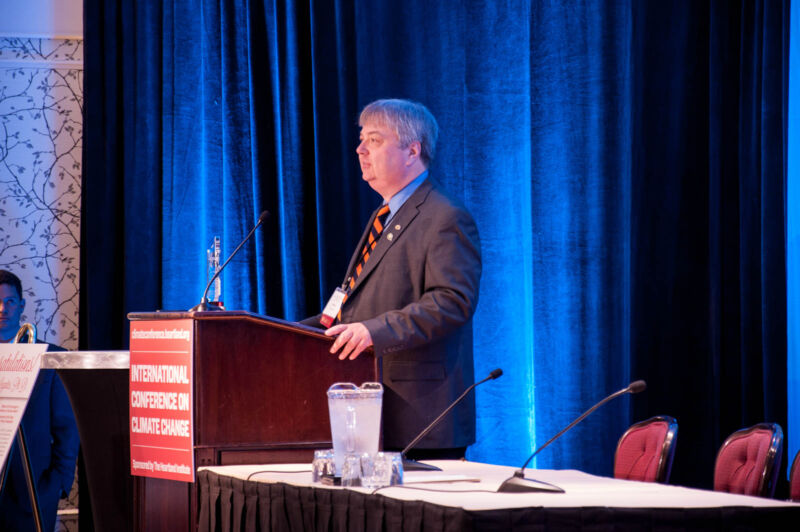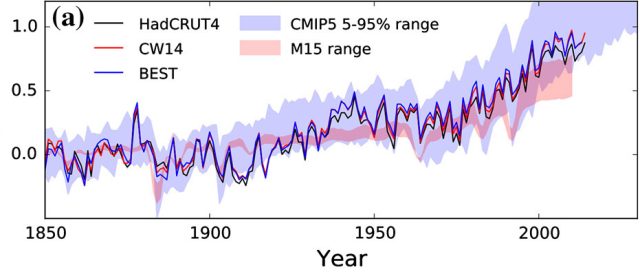

reader comments
269 with 120 posters participating, including story author
The US National Oceanic and Atmospheric Administration recently hired a new person in an upper-level deputy assistant secretary position. Normally, this would not be too surprising or newsworthy, but this is an exception. Joining NOAA as the “Deputy Assistant Secretary of Commerce for Environmental Observation and Prediction” is University of Delaware Professor David Legates—a well-known contrarian who rejects the science of human-caused climate change.
The position apparently reports to acting head of NOAA Neil Jacobs, although the circumstances of the hire are unknown. Ars asked NOAA about the duties of this position, but the agency has not responded. Jacobs was entangled in the fallout from President Trump’s inaccurate tweets about Hurricane Dorian that culminated in a forecast map doctored with a black marker. A pair of investigations found that Jacobs capitulated to directives from the office of Commerce Secretary Wilbur Ross and the White House, releasing an unsigned NOAA statement that sought to rescue the president’s inaccurate statements by mildly admonishing the forecasters who corrected him.
The Washington Post reported that Legates’ department at the University of Delaware informed students in an email that he would not be teaching in the fall semester while noting, “David hopes to be back at UD in the spring.”
Whatever it is, I’m against it
Legates was Delaware’s State Climatologist between 2005 and 2011. Although he started his career working on precipitation data and patterns, he is primarily known for rejecting, at every opportunity, the human role in climate change. He’s a frequent contributor to work by the Heartland Institute—a “think tank” that opposes the facts of climate science. When Ars visited a Heartland conference in 2015, Legates was there, presenting a talk that waved away trends in US rainfall extremes as an artifact of measurement changes.
Legates was also a lead author of a 2018 Heartland “Climate Change Reconsidered” report, which adopts the format and trappings of the Intergovernmental Panel on Climate Change—even calling its coterie of bloggers the “Nongovernmental International Panel on Climate Change”—but presents long-debunked nonsense.
For example, the report’s summary concludes, “There is no compelling scientific evidence of long-term trends in global mean temperatures or climate impacts that exceed the bounds of natural variability.” It cannot be overstated how demonstrably false that is.
Why limit your trolling to climate?
In April, Legates co-authored a blog post on the Heartland Institute website about COVID-19 models that linked to a conspiratorial post about “inflated” death numbers.
“It is vital that they recheck the models and assumptions” the post reads, “and distinguish between COVID-19 deaths actually due to the virus… and not just associated with or compounded by it, but primarily due to age, obesity, pneumonia, or other issues. We can’t afford a cure that’s worse than the disease—or a prolonged and deadly national economic shutdown that could have been shortened by updated and corrected models.”
The post then turns to criticize climate models, falsely claiming that they “have always overstated the warming.” It even repeats the ancient canard that climate scientists “alter” temperature data. These views are certainly relevant given the “Environmental Observation and Prediction” in Legates’ NOAA job title.
Legates also contributed to a 2019 Heartland brief on sea level that falsely stated:
Contrary to the IPCC’s statement that it is “very likely” sea-level rise is accelerating, Burton (2018) reports the highest quality coastal tide gauges from around the world show no evidence of acceleration since the 1920s or before, and therefore no evidence of being affected by rising atmospheric CO2 levels.
(That Burton citation is not a peer-reviewed study, by the way, but simply a website that plots tide-gauge data.)
In 2015, Legates and several other Heartland regulars published a paper titled “Why models run hot: results from an irreducibly simple climate model.” Their model projected no more than 1°C of global warming through the year 2100, in stark contrast to published research. This was because the paper claimed that the sensitivity of Earth’s climate to greenhouse gases was far lower than estimated by climate scientists.
The problem, according to a response published by a group of scientists, was that their model was a mess. For starters, it assumed that the climate system responded instantaneously to increased greenhouse gases, thumbing its nose at the existence of the ocean. And some of the values controlling their model were selected by analogy to voltage-controlled electronic circuits, because they believed the system was too stable to have significant amplifying feedbacks.
But most unbelievably, the paper had declined to compare its model to observed global temperatures—because the modeled temperatures were far lower than reality. Instead, they created a hypothetical global temperature record based on cherry-picked periods and then treated the successful fit as evidence of their model’s accuracy. (Real climate models actually match real temperature data.)

Everyone says I’m wrong because I’m right
Legates is also in the tiny Rolodex of credentialed contrarians who get invited to government hearings to testify that climate science is “unsettled.” In 2014, he testified before the Senate Environment and Public Works Committee that climate change is not harming agriculture in the United States. He claimed that the data shows no changes in drought and criticized the use of climate models as scientific tools.
“Droughts that have happened in the past are likely to occur again, and with likely similar frequencies and intensities; thus, preparation for their return is a better strategy than trying to mitigate them through draconian CO2 emission control policies,” he testified.
Much of his testimony focused not science but on his supposed persecution for “dissent.” Like other contrarians obsessed with pushing conclusions that the evidence does not support, he chalks up the rejected papers (and challenges to his status as state climatologist) not to his own mistakes but to a conspiracy to squash “independent thinking.” This imagined persecution earned Legates a “Courage in Defense of Science Award” at that 2015 Heartland Institute conference.
Ideas like the above have become common from politicians and performative committee hearings, but they’ll now be represented at the upper level of NOAA—an agency tasked with critical real-time monitoring and research.
This is part of a pattern under the Trump administration, of course. While meeting with California officials about record-setting wildfires on Tuesday, President Trump disregarded concerns about the inescapable reality of warming temperatures, saying, “It’ll start getting cooler, you just watch.” When California Secretary for Natural Resources Wade Crowfoot responded that he wished science agreed, Trump added, “I don’t think science knows, actually.”


